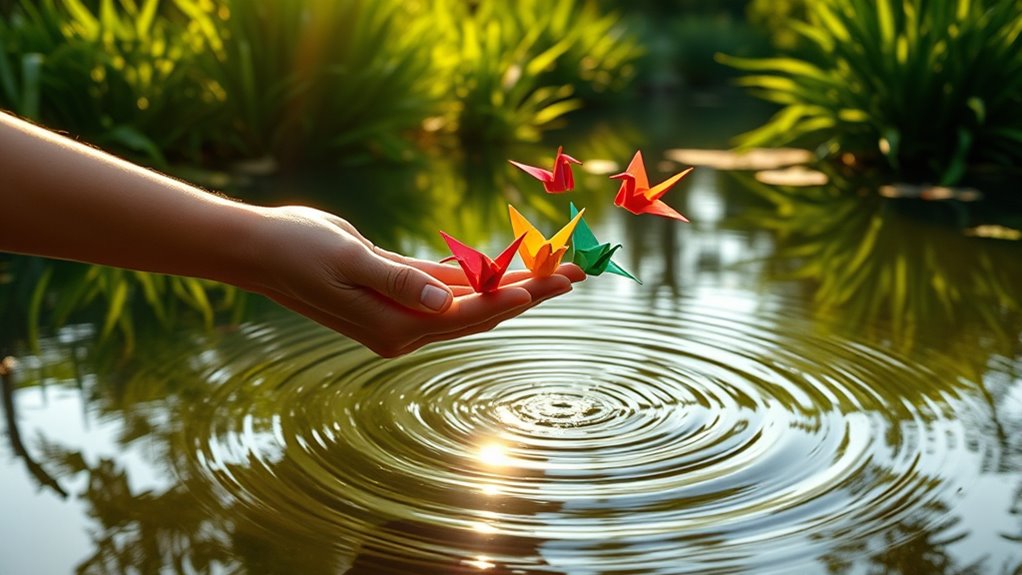Practicing daily gratitude can spark a ripple effect by transforming your mindset, making you more positive and resilient. When you focus on appreciating small blessings, you strengthen your relationships and inspire others to do the same. This contagious positivity extends beyond your personal life, creating a more compassionate and supportive community. Keep exploring how consistent gratitude fuels growth and spreads kindness, shaping a brighter environment for everyone involved.
Key Takeaways
- Daily gratitude cultivates a positive mindset that influences attitudes and interactions, inspiring others to adopt similar appreciation practices.
- Expressing gratitude strengthens relationships by fostering feelings of being valued and appreciated, creating a ripple of kindness.
- Practicing gratitude enhances emotional resilience, helping individuals manage setbacks with optimism and confidence.
- A grateful outlook encourages community kindness and patience, promoting a more compassionate and supportive environment.
- Consistent gratitude practices generate lasting well-being, spreading positivity and fostering a cycle of growth within individuals and groups.

Practicing daily gratitude can create a powerful ripple effect that transforms your mindset and relationships. When you focus on mindful appreciation, you’re training yourself to notice the good in everyday moments instead of dwelling on what’s lacking. This simple shift helps cultivate a positive mindset, which influences how you see the world and interact with others. By intentionally acknowledging the small blessings—whether it’s a warm cup of coffee, a kind word from a friend, or a peaceful sunrise—you send a signal to your brain that life is worth appreciating. Over time, this practice rewires your thoughts, making positivity more natural and accessible.
As you develop this habit, you’ll start to notice subtle changes in your attitude. Instead of reacting with frustration or impatience, you approach challenges with a sense of calm and gratitude. Your heightened awareness of small joys fosters a more optimistic outlook, which becomes contagious to those around you. When you express gratitude sincerely, you reinforce your connections and strengthen your relationships. People feel appreciated and valued, and this encourages a cycle of kindness and mutual respect. The more you practice mindful appreciation, the more effortlessly gratitude flows from your interactions, creating a cycle that benefits everyone involved.
Daily gratitude also helps you build resilience. When setbacks happen, your positive mindset allows you to see opportunities for growth rather than dwelling solely on problems. This perspective isn’t about ignoring difficulties but approaching them with a sense of hope and confidence. As your gratitude practice deepens, you begin to notice how many aspects of your life are going well, which diminishes feelings of stress and anxiety. Your focus shifts from what’s missing to what’s abundant, fueling a sense of contentment and well-being. Additionally, cultivating mindful appreciation helps you become more aware of your thoughts and emotions, fostering greater self-awareness and emotional intelligence.
Furthermore, this ripple effect extends beyond your personal life. Your enthusiasm and positivity influence your environment, inspiring others to adopt similar mindful appreciation. Whether at work, home, or in your community, your example can encourage a collective mindset that values kindness, patience, and gratitude. Over time, these small daily acts build a foundation for a more compassionate and resilient community. In essence, practicing daily gratitude isn’t just about feeling good in the moment; it’s about creating a lasting impact that touches every part of your life, fostering a cycle of positivity that continues to grow and spread.
Frequently Asked Questions
How Long Does It Take to See Noticeable Benefits From Daily Gratitude?
You might see noticeable benefits from daily gratitude within a few weeks, but timing variability and individual differences play a role. Some people experience quick improvements in mood and outlook, while others may take longer. Consistency is key, and you’ll likely notice small shifts early on that grow over time. Keep practicing daily, and you’ll increase your chances of experiencing the positive ripple effects of gratitude sooner rather than later.
Can Daily Gratitude Improve Mental Health in the Long Term?
Think of daily gratitude as planting seeds in a garden; over time, it nurtures emotional resilience and reduces stress. When you practice gratitude regularly, you build mental strength to face challenges, leading to long-term improvements in mental health. This ongoing habit creates a foundation of positivity that helps you handle life’s ups and downs more effectively, ultimately fostering a healthier, more balanced mind.
Is There an Optimal Time of Day to Practice Gratitude?
You’re most likely to see the best timing effectiveness when you practice gratitude in the morning or evening. Morning gratitude sets a positive tone for your day, boosting your mood and resilience. Evening gratitude helps you reflect and wind down, enhancing sleep quality. Both times are effective, but choose what fits your schedule and feels most natural, so you’re more consistent and can reap the long-term mental health benefits.
How Does Gratitude Affect Relationships Beyond Personal Well-Being?
When you practice gratitude, you strengthen emotional connections and enhance social bonding. Expressing appreciation fosters trust and understanding, making your relationships more resilient. By regularly showing gratitude, you create a positive cycle that encourages others to do the same, deepening your bond. This mutual recognition builds a supportive environment where everyone feels valued, ultimately improving communication and fostering lasting, meaningful relationships beyond your personal well-being.
Are There Cultural Differences in Expressing Daily Gratitude?
Yes, cultural differences influence how you express daily gratitude. In some cultures, you might show appreciation through direct words or gestures, aligning with open expression styles. In others, gratitude is conveyed subtly, respecting cultural norms of humility and indirect communication. Recognizing these differences helps you better understand and connect with others, fostering stronger relationships by respecting diverse expression styles and adapting your approach accordingly.
Conclusion
By practicing daily gratitude, you create ripples that extend beyond yourself, touching others in unexpected ways. It’s a simple act that can brighten someone’s day, yet it also transforms your perspective, fostering genuine contentment. As you embrace gratitude amid life’s chaos, you realize that small moments of appreciation hold immense power—both to uplift your spirit and to inspire kindness in others. In this quiet act, you hold the potential to spark a profound, lasting change.








